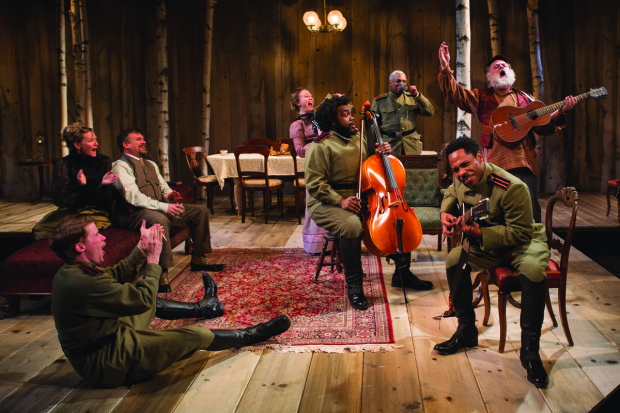Three Sisters

(© Teresa Wood)
Studio Theatre is currently producing two radically different versions of Chekhov's Three Sisters. The first is a more conventional production, which sticks to Chekhov's original script and characters. The second, No Sisters, written and directed by Aaron Posner, uses eight of Chekhov's characters but gives them a totally new script. The first production contains a mix of sadness, boisterousness, melancholy, and hilarity – all essential elements to Chekhov, who wrote about situations that were not completely about joy, nor sorrow, but rather about what Chekhov saw as the prevailing condition of life: tragicomedy.
Three Sisters takes place over a period of four years in a backwater town in Russia in the Prózorov household in the early 20th century. The first scene introduces three young women – Ólga, Másha, and Irína – who lived in Moscow when they were young. Now they long to return to the cosmopolitan city where they believe life will be wonderful. Their brother, Andréy, is a lonely man affianced to a bourgeois woman named Natásha, sure that his marriage will solve all his problems. Masha's husband, Kulýgin, is a self-satisfied high school teacher, a lonely bore whose wife abhors him.
A battery of soldiers, stationed in town, add some occasional energy to the Prózorov household, including Chebutýkin, an army doctor, and Vershínin, the battery commander, both of whom knew the sisters when they were young in Moscow. When Vershínin falls in love with Másha, he realizes that he might actually be capable of happiness, but he is married to a suicidal woman and won't leave her for the sake of his two children. Baron Túzenbach is a first lieutenant who falls in love with Irína.
While Three Sisters is often directed at a slow pace, envisioning the sisters as the embodiments of misery, moving through life at an agonizingly languid walk, director Jackson Gay reverses that approach and treats Three Sisters as Chekhov did: a situation in which events are more often shades of gray than black or white. Gay takes this translation by Paul Schmidt and finds a great deal of humor in it, capitalizing on the off-center language Chekhov gave his characters. People speak over one another, sometimes one character asks a question and another character responds to a different question — there is no orderly dramatic arc to the play.
Ryan Rilette is solid as Andréy Prózorov, who, dreaming of becoming a professor, can find no solace in marriage or fatherhood. Bridget Flanery is excellent as Ólga, the oldest sister. Flanery gives a good sense of the aging woman who only wanted to marry and have children. Másha, played with ferocity by Caroline Hewitt, is especially fine at the end of the play, when she cannot bear it when her lover leaves town. Emilie Krause plays Irína as a particularly unrealistic young woman who believes that a perfect love will come to her someday.
As Vershínin, Greg Stuhr is very romantic and gentle toward Másha, though unrealistic about his own unwillingness to leave his wife. Todd Scofield is a wonderful Kulýgin, the ridiculous teacher, always spouting Latin phrases. Ro Boddie is a charming, unpretentious Baron Túzenbach, who adores Irína and longs to take her away from her hateful life. Kimberly Gilbert steals the show as Natásha, who first appears as an ignorant, badly dressed girl, but by the end of the play has taken over the house, ruined her husband, and alienated everyone. Biko Eisen-Martin reveals curious corners of his personality as Solyóny, who thinks of himself as a poet. Craig Wallace and Nancy Robinette join the cast in the roles of Chebutýkin, the army doctor who once knew the sisters' parents, and Anfísa, the Prózorov's nurse.
Daniel Conway's simple but stunning set places white birch trees around the area that is the Prozorov's living room and dining room. In the rear is a long dinner table set for a formal meal. In the foreground are upholstered chairs. In Act 2, a bed, dressing screen, and dresser are brought in. Jessica Ford's costumes are traditional turn-of-the-century clothes. The women's beautiful dresses and hats are made with great attention to detail.
Chekhov is often accused of being a master of moodiness and melancholy. Gay's approach makes it clear that she does not see these sisters or their companions in that light. Instead, as Chekhov wrote them, they are honest, complicated humans trying to be happy and simply not succeeding.












